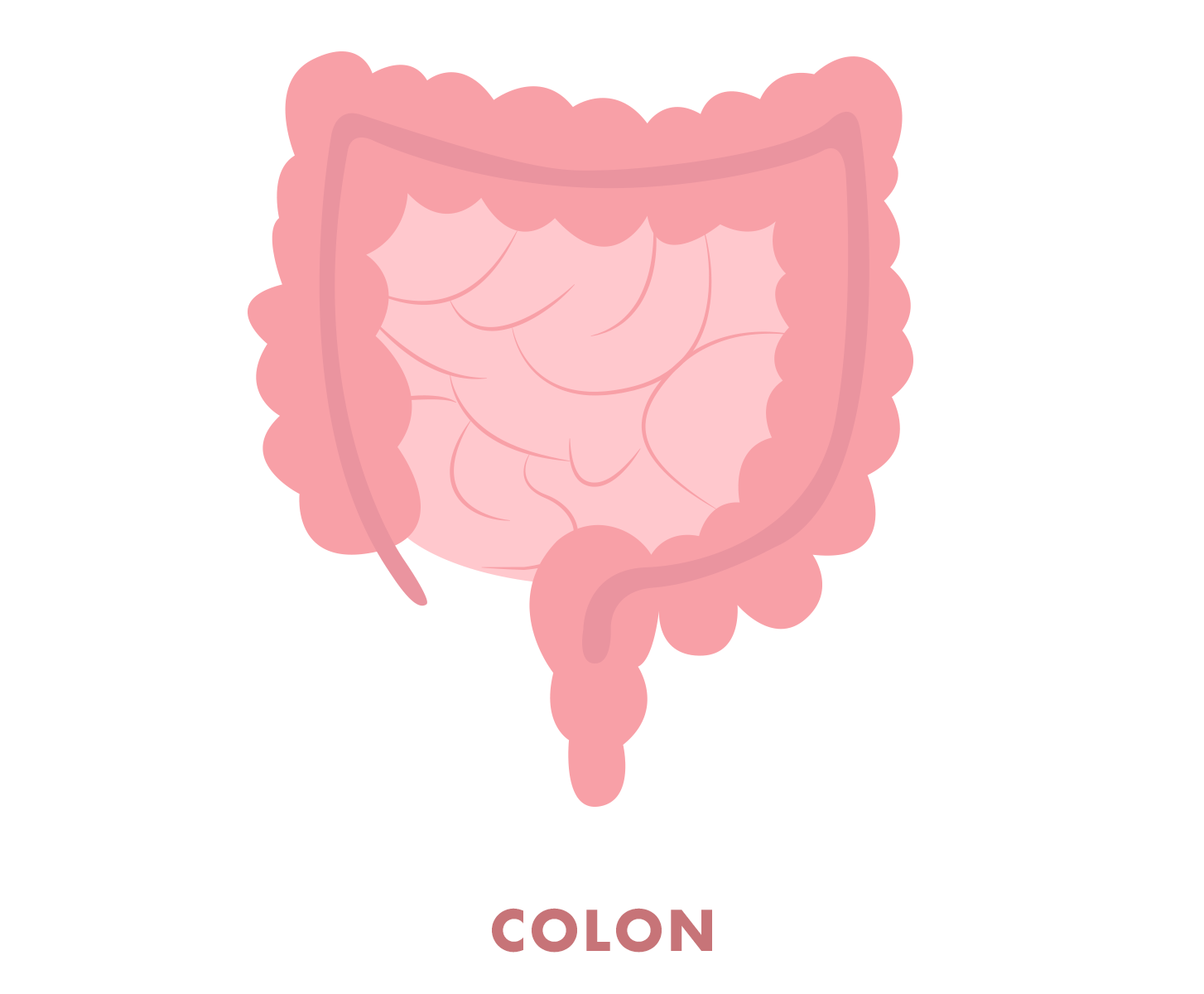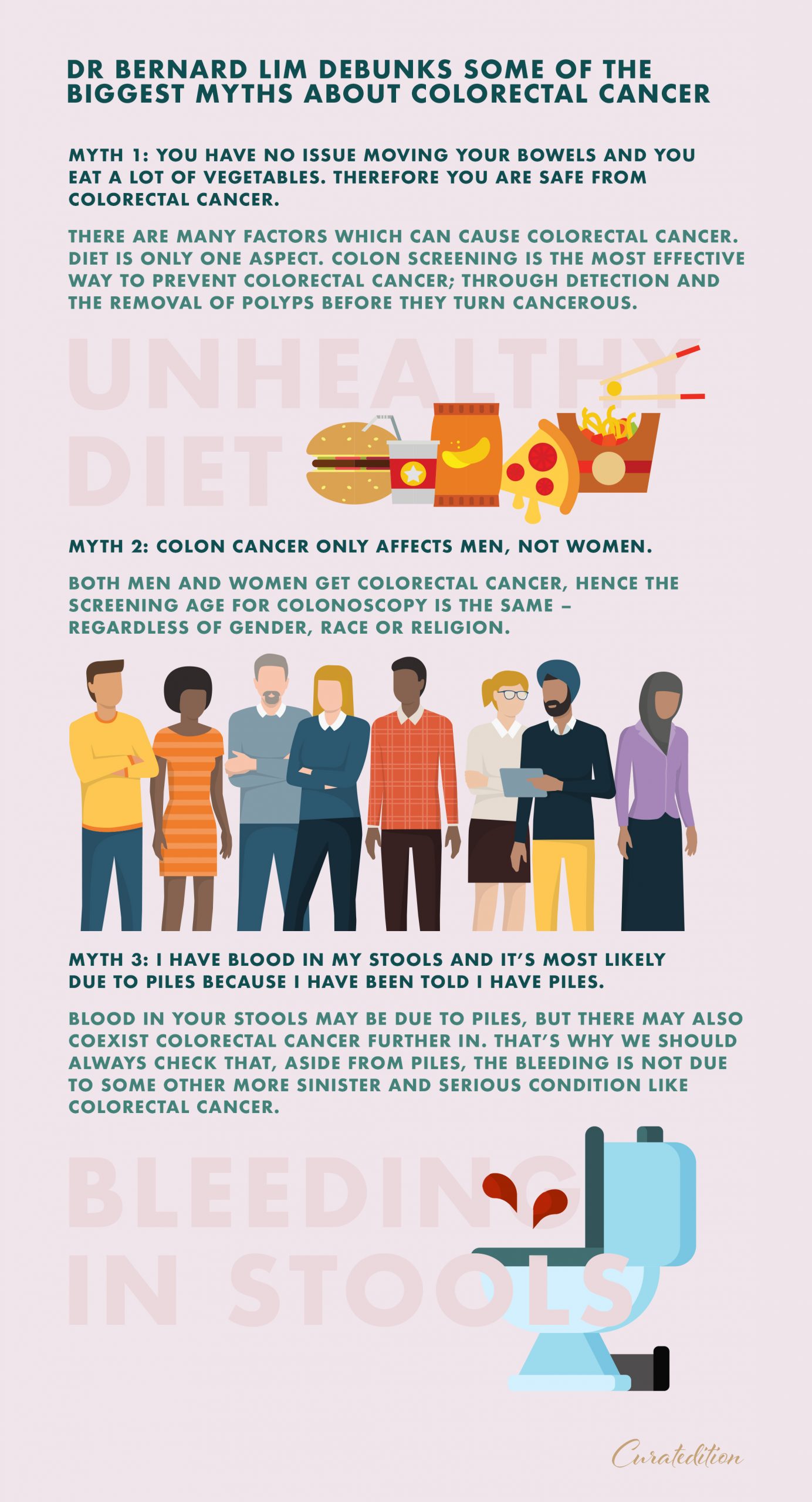Colorectal Cancer – it is still one of the top 3 cancers diagnosed in Singaporeans. Together with colorectal specialist, Dr. Bernard Lim, the issues of why, when and how are addressed regarding this disease.
Most of us already know this: colorectal cancer affects the colon and rectum, also known as the large intestine. Polyps or lumps sometimes form on the inner wall and mostly they are benign, or non-cancerous. Unfortunately, certain types of polyps can develop into cancer.
 Despite knowing quite a bit about this disease, it continues to rise in numbers amongst us. According to expert Dr Bernard Lim, “Colorectal cancer is the no.1 cancer for men in Singapore and No.2 cancer for Women in Singapore. Hence for Men and Women combined, it’s the top cancer in Singapore currently.”
Despite knowing quite a bit about this disease, it continues to rise in numbers amongst us. According to expert Dr Bernard Lim, “Colorectal cancer is the no.1 cancer for men in Singapore and No.2 cancer for Women in Singapore. Hence for Men and Women combined, it’s the top cancer in Singapore currently.”
Colorectal screening involves checking the colon for any polyps and removing them for biopsy, before they start to progress to cancer. In the early stages of colorectal cancer, the cancer cells are only found in the colon. If undetected, the cancer will develop and project into the spaces in the colon, through the colon wall and spread to neighbouring intestines, organs, lymphatic system and travel through the bloodstream to the liver.
Easily preventable with screening
Now that we got the horror story out of the way, it’s important to remember that colorectal cancer is not necessarily a death sentence, especially if detected early. And new developments in treatment have also assisted in improving the chances of recovery. In fact, as Dr Lim explains, the very act of going for a colonoscopy may very well prevent or lower the chances of getting colorectal cancer, “It is treatable via surgery and even preventable through the colonoscopy and removal of polyps, if and when they may arise.”
 He also elaborates on the different treatments employed, “If detected earlier, the treatment of choice is surgery and this can usually be done via a keyhole or minimally invasive approach (laparoscopy) where it involves faster healing, less pain and a shorter hospitalisation period. The large colon with the tumour and surrounding lymph nodes are removed and the remaining colon joined back together, often without a need for any stoma. (Ed: A stoma is an opening made on the stomach to allow urine and faeces to be diverted out of your body.) Only if the tumour is detected at a late stage, then after surgery, one has to undergo radio or chemotherapy as well.”
He also elaborates on the different treatments employed, “If detected earlier, the treatment of choice is surgery and this can usually be done via a keyhole or minimally invasive approach (laparoscopy) where it involves faster healing, less pain and a shorter hospitalisation period. The large colon with the tumour and surrounding lymph nodes are removed and the remaining colon joined back together, often without a need for any stoma. (Ed: A stoma is an opening made on the stomach to allow urine and faeces to be diverted out of your body.) Only if the tumour is detected at a late stage, then after surgery, one has to undergo radio or chemotherapy as well.”
Regular screening is crucial
In fact, Dr Lim could not stress enough the importance of regular screening to avoid having to deal with a disease that very often shows no symptoms until it is a tad too late. “There are often no symptoms for early cancer or polyps; one will pass motion without symptoms. However, if they grow larger, they can cause blockage, or bleed, or give pain, and the symptoms would be that of a change in bowel habit, abdominal distension (bloating) or blood in the stools. If you are worried about cancer, it’s best not to wait for symptoms before going for screening.”
In this instance, it is really a case of the early bird catching the worm, “The patient who has the highest chance of survival after surgery is one who has an earlier stage of cancer. Hence earlier screening with detection is the most important factor.”
And it seems that the cases continue to rise in Singapore. The reasons as most of us already know are linked to our lifestyle choices, like diet. Dr Lim elaborates, “Colorectal cancer is a multifactorial disease and its rise in incidence is due the western diet which we adopt: the red meat, bbq food and processed food, and so on. The other factors involved are that of genetics, environment and sometimes, the onset can be random.”
Does age and eating veggies matter?
 And it seems the risk of occurrence rises with age. However, Dr Lim is quick to emphasise that it is more than just age that determines who should be watchful to their health, “Everyone is at risk, including people who are vegetarians or people who have no issue moving their bowels. Early cancer has no symptoms! And just eating vegetables is not enough to prevent colorectal cancer; one has to still go for screening at the right time.”
And it seems the risk of occurrence rises with age. However, Dr Lim is quick to emphasise that it is more than just age that determines who should be watchful to their health, “Everyone is at risk, including people who are vegetarians or people who have no issue moving their bowels. Early cancer has no symptoms! And just eating vegetables is not enough to prevent colorectal cancer; one has to still go for screening at the right time.”
Aside from the all important regular screenings, Dr Lim also points out some of the preventive measures that we can do to help keep this cancer at bay, “Adequate fibre, avoid processed food, don’t smoke, and exercise; these are all important lifestyle factors. But these are not enough. The most important thing is to go for colon screening when at the right age. If you have symptoms, do seek medical attention as you may need a colon evaluation earlier.”
Yes we’ve all heard Dr Lim. Be healthy, stay well but don’t put off going for that screening.

Register or schedule an appointment with Dr. Lim Yon Kuei Bernard here.
More about Dr. Lim Yon Kuei Bernard:
Dr. Lim Yon Kuei Bernard
MBBS (S’pore), FRCSEdin (Surgery),
MMED (Surgery), FAMS (Surg)
Bernard Lim Specialist Surgery is at 38 Irrawaddy Rd, #08-52 Mount Elizabeth Novena Specialist Centre @ Mount Elizabeth Novena Hospital, Singapore (329563)
Register or schedule an appointment here.
Services:
Abscess ⋅ Anal Fissure ⋅ Anal Surgery ⋅ Appendix Surgery ⋅ Colon/Rectal Cancer Surgery ⋅ Colonoscopy ⋅ Colorectal Cancer ⋅ Fistula In Ano (FIA) ⋅ Gastroscopy ⋅ Hernia Surgery ⋅ Piles/Haemorrhoids ⋅ Skin Tags and Warts ⋅ Stoma Management
This feature article is produced in consultation with Dr. Bernard Lim, from Bernard Lim Specialist Surgery. Artwork by Curatedition, all rights reserved.
All content featured in Curatedition Health and Wellness articles is for informational purposes only and not intended to be a substitute for personalised professional medical advice, diagnosis, or treatment. If you think you have a medical emergency, call your doctor, qualified health service provider, or 995 immediately.
Related links:
DocTalk: Get the Smile You Want
DocTalk: 6 Signs that You May Have A Sleep Problem
DocTalk: How Too Much Screen Time and Blue Light Affect Your Eyes
Stay Home, Stay Well, Stay Sane
Face Masks: Where to Get Your New Wardrobe Staple in Singapore

